One book at a time … or several?
Also in today's blog
Comparing three book jackets
Training to be a writer
Australian late starter on shortlist
First, an apology for absence
I'm sorry there wasn't a new blog here last Sunday. I had to take an unexpected trip, without my laptop. Although the blog had been written and was ready to publish, when I tried to do it from an internet café at my destination, access was blocked. My own fault: I hadn't made a note of the password in my diary and clearly the one I used was the wrong one.
On returning home, I read Adrian Weston's comment "Don't hanker after attending the book fair - I've spent three days of the last week trapped there and it is hell on earth."
So far I've been too busy dealing with a huge backlog of incoming emails to read all the reports on the London Book Fair, apart from the one at Publishing News, but I suppose it was to be expected that the first LBF to be held at a new location would be glitch-prone.
Every third Wednesday in the month I lunch with a group of bookworms, all of us expats-in-Spain. Six of us turned up for the February lunch at the restaurant of a golf club not far from the coast where we hoped to, and did, eat well. This month we shall meet somewhere else.
At the last lunch I sat next to someone who used to be a textile designer. She brought with her a large plastic bag full of paperback discards, most of which were taken home by the rest of us. The few books nobody wanted were going to be given to a charity shop.
When, during the first course, I mentioned that I had three books on the go, another member of the group said she couldn't understand how anyone could read more than one book at a time. Her view seemed to be shared by the others, making me wonder if it's abnormal to read different books at different times of day. I'd be interested to hear your thoughts on this.
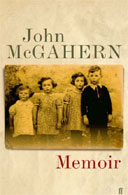
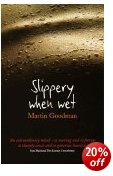
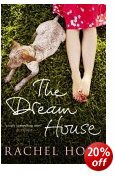
As you see, the books I'm reading at present are, from left to right
Memoir by "Ireland's greatest living novelist", John McGahern [Faber & Faber]
Slippery When Wet by Martin Goodman, first male writer published by Transita
The Dream House [ Pocket Books] by Rachel Hore, a former publisher
I shall write more about these books when I've finished them. Meanwhile I have no problem reading a few chapters of one at breakfast, switching to another during my lunch break and becoming engrossed in the third when I go to bed.
Comments on three book jackets
Of the three jackets, I find Memoir the most appealing, but you need to see it full-size to have your attention grabbed by the wary, slightly hostile expressions on the 1930s children's faces.
As you'll guess from the discount stickers, the other two jackets were "borrowed" from Amazon UK.
Since it came into my hands, several people have remarked that the title Slippery When Wet has a salacious undertone. That aspect didn't strike me until they mentioned it. My first reaction was - "What possessed Transita to give Martin Goodman such a dismal cover?" on which his name doesn't show to advantage, and nor does the quote - "An extraordinary novel - so moving and so funny; so sharply acute and so generous hearted."
The writer who likes the superfluous word 'so' is Sara Maitland, a reader for The Literary Consultancy.
The girl's legs on The Dream House are unattractively winter-white and the dog is not particularly engaging. But the title has a universal appeal. Almost everyone has a dream house and will be curious to know what the dream house in this novel is like.
[In passing, my dream house is Longwarden.]
Martin Goodman sent me a copy of his book after reading the 'Nothing to buy' opinion piece I wrote for The Bookseller last month. He emailed that, in book blog terms, his novel raised the question "can males write women?"
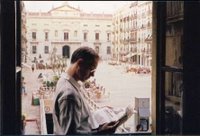
He went on, "The book was also a very conscious way of writing about Bangladesh for the UK market - with a visit to Thailand on the side - so it seems to fit your own travel book profile…I'd be surprised if you didn't enjoy it - but am happy to take the risk."
The people at Transita obviously feel he has succeeded in writing convincingly about a woman. I'll post my opinion later this month.
The picture of Martin standing by a window in Tarragona, Spain, is taken from his website.
Training to be a writer
As I've mentioned before, I'm mystified when people who claim to have been writing stories since they were children then reveal that they've spent a large chunk of their life doing a job in a different sphere.
How, born with the creative gene, could they waste their gift while teaching, nursing, banking etc.? I can see a tenuous connection between librarianship and writing, but by far the best route to becoming a writer is the one chosen by
Rudyard Kipling
Ernest Hemingway and
Robert Louis Stevenson. All three - and many other distinguished writers - started out as newspaper reporters.
Commenting on last week's Bookworm blog on a private forum - I have her permission to quote her here- Fiona Lowe wrote -
"As for journalism, I didn't follow that path for two reasons:
1. At the time I was deciding what I wanted to do when I "grew up" I was torn between going to art school or dance college. The little voice that said one day I would write a book was there in the back of
my head, but being soundly ignored.
2. My father was a journalist, and very good at it. It's a hard business and you have to be tough to survive in it. At 18 I knew I just didn't have the confidence or the personality to follow that path.
However, now I feel like I've "found" writing again, I do wonder if I'd have found it sooner if I'd made a different career choice all those years ago."
Fiona, who spent part of her childhood in Papua, New Guinea, describes herself as "an Aussie but I've lived in Edmonton Canada, Madison Wisconsin, and I currently live by the sea close to the Great Ocean Road, in southern Victoria, Australia."
Australian late starter on short list
Another Australian, Ashleigh Bingham, said in an interview at Romance Writers of Australia
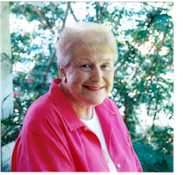
"I've been reading incessantly since I was five years old, and I think I've been writing almost as long. I began my first novel when I was fourteen, and had my first publications in school magazines. I've always been a dreamer, with a head full of characters clamouring for their stories to be told, and some of these later turned into short stories that I entered in competitions or submitted to women's magazines. Sometimes I made a sale, sometimes I got a rejection. I guess it was all part of the learning curve, and one thing I learned through it all was to keep writing and keep submitting. Who was it said: 'The harder I work, the luckier I get'?"[ According to Brainy Quote it was film producer Samuel Goldwyn ]
Ashleigh Bingham also told the interviewer, "When I left a very busy, stressful career, I really imagined I would devote myself exclusively to writing."
I'll be writing more about Ashleigh Bingham's past and present careers next time.
Wenlock's first go at Storycoding
Google alerted me to the following reference to my blog at Wenlock's blog.
Sunday, February 26, 2006 In her Bookworm on the Net blog today, Anne Weale flagged up Storycode…a site which collates reader assessments of novels, and uses them to come up with recommendations for other books...this could be a really useful site, once it has a few thousand more contributors, so I strongly encourage you all to give it a go.
Wenlock's first experience of this form of coding makes interesting reading if you haven't already read his comments.
